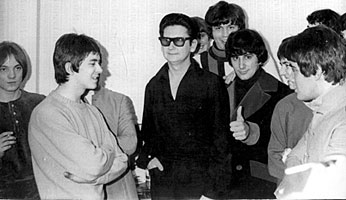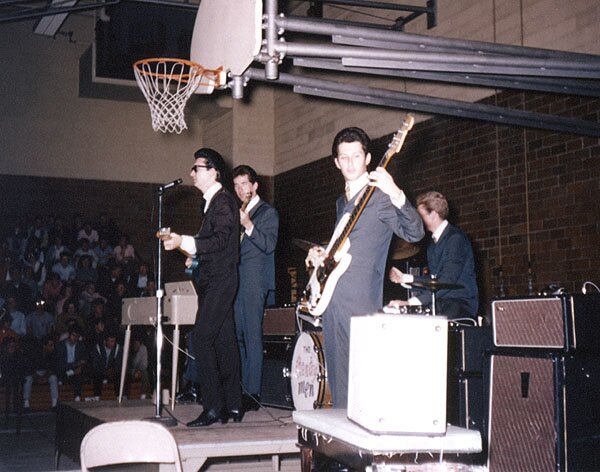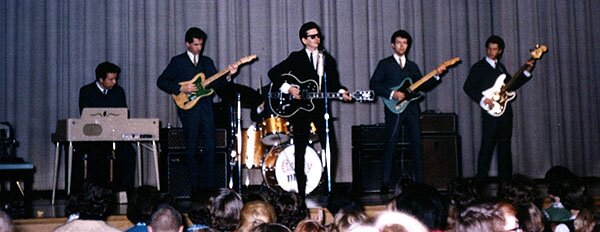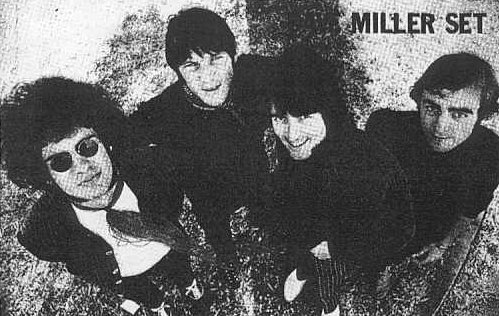
The photo of the
DAVE MILLER SET which appeared on their
'68 EP,
Hope
?/1968
The Dave Miller Set [Spin EX 11530]
Hope / Havin' A Party // Why Why Why / Hard Hard Year
Their next single, appropriately entitled
Hope, had a particularly interesting background. The original version came from the
1967 debut album by
The Candymen, and it was co-written by
Buddy Buie and
Candymen lead guitarist John Rainey Adams[sic]. They started out in the '50s in
Dothan, Alabama as members of
The Webs, the group that launched the career of singer
Bobby Goldsboro, a childhood friend of
Buie's. When they backed
Roy Orbison on a visit to
Dothan he was so impressed that he hired them on the spot as his permanent band, and and
Buie became his tour manager. Renamed
The Candymen, they worked with Roy for seven years, touring the world, and
Adkins played lead on many
'Big O' classics including
Oh Pretty Woman. After they left Roy they cut two albums under their own name for ABC and
Buie became a successful songwriter-producer, with credits including
the Classics Four's Windy and Spooky, as well as hits for
Billy Joe Royal and
BJ Thomas. In the '70s he set up his own studio in Atlanta, where he put together the session band that became
The Atlanta Rhythm Section.
Released in
April 1968, Hope was a quantum leap in the band's studio work.
Dave cites it as one of his favourite recordings, and its not hard to see why -- it's a psych-pop classic, a tremendously strong and hugely enjoyable record that brims with confidence and optimism. Dave's vocal is spot-on and the infectious backing, in a brisk march tempo, skips along with some great ensemble playing by the group. It's topped off by Pat's sparkling arrangement for horns, piccolos and strings (with contributions from Sven Libaek, who scored the horns and piccolos). The B-side is a swinging, good-time version of Sam Cooke's Havin' A Party, a perennial stage favourite that Dave often performed with The Byrds which he updated with the namechecks of Stone Free and Strange Brew.
The single did quite well in Sydney, peaking at #27, largely thanks to
Ward Austin of 2UW who liked the song and was instrumental in breaking it into the chart with regular airings on his afternoon shift.
http://www.milesago.com/artists/dms.htm
From an article entitled
Watching Bobby Grow by Jim Bickhart
The spring of
Bobby's senior year in high school rolled around along about this time, and one day he found himself sitting in the school cafeteria eating lunch. Word had gotten around that he was doing some picking ( not many high school kids were doing too much picking those days, especially the all-star baseball players ), and the guys in the school's " biggest" rock and roll band asked
Bobby to come jam with them one afternoon.
"Somewhere they got the idea I was pretty good," laughs Goldsboro. "I mean, I was trying to write some stuff and working out rhythm parts, but I was mainly good at figuring out the chords to songs right off. So I go over to where they were set up and watch their guitar player do Chet Atkins picking. He was sloppy, but it was recognizably ambitious, and I was real impressed.
"They were trying to work out some old
Rick Nelson hit; something like
'Poor Little Fool'. It had a real straight progression, but they couldn't get the minor chord. So they asked me and I knew it right away. Played along with the record, and they were impressed. A couple of days later, I got a phone call from one of them,
a deep-voiced kid named John Rainey. He asked me if I 'wanted to make $10 this weekend playin' at a teen dance.' their lead singer was going out of town and they needed an extra guitarist so
Rainey could sing. I figured 'why not?' Playing guitar was a lot of fun and if someone would pay you to go someplace and do it, who was I to refuse? "
A rehearsal or two later,
Bobby was ready. The band had him memorize a couple of Rick nelson's hits, including the aforementioned "Poor Little Fool," and told him he'd have to sing those at the gig. His attempts to beg off failed, and he went into his first job as a guitarist technically, if not mentally. prepared to make his singing debut as well.
"I kept stalling around," he says, "finding some other song to play every time
Rainey asked me to sing one of my numbers. Finally, in the middle of the second set, we ran out of alternatives. So I moved my microphone over behind a pillar and hid while I sang. Right in the middle of the song,
Poor Little Fool, some girl stuck her head around the post to see who was singing and nearly scared me into forgetting the rest of the song. That was my first public singing experience."
By summer, he was in this band, called the
Webbs, fulltime, wearing his hair greased back, dressed in a sport coat and tie decorated with spider webs. They were just about the only truly competent band in the area of
Dothan and it was paying off in terms of employment.
"When I went off to
Auburn, I stayed with the band," explaines
Goldsboro, "I'd borrow my brother's car or take a bus and go back to
Dothan for weekend gigs. I was majoring in Business Administration and doing okay, but I was really beginning to think about music a lot.
My second year, Rainey and the bass player came to
Auburn too, we found a new drummer and became the hot band on campus.
"Being the campus rock and roll band was pretty good," he continues. "I wasn't the coolest guy around, my hair all slicked back and being so short and all, but all the fraternities were rushing me, inviting me to parties and being real friendly. I took everything I could get but never joined a one of them. I figured they thought they'd be getting a free band for all their parties and I wasn't buying that."
Bobby remembers one big weekend when adjacent frat houses threw competing parties, one hiring an equally renowned band from Florida State; these two bands dominated the college dance and party scene in the Southwest that year, and the overflow crowds at the two parties poured out into the street all night.
"Those parties were really wild, " he says, "everyone hot and sweaty, dancin' in that humidity, while we'd be up there in our outfits, cool as you please, playing away. Our big number was
'Walk Don't Run'; we had the
Ventures down cold."
Between the weekend gigs at school and the vacation dates around the South, the
Webbs were beginning to build up a widespread reputation. Their travels took them from Florida all the way to Missouri, with each musician earning up to $100 a night.
By the end of Bobby's second year in college, an old high school friend named
Bubby Buie had become more or less the manager of the
Webbs.
Buddy, now a prominent producer and writer in Nashville, had notions of becoming an enterpreneur as well, so he began to book concerts. The
Webbs, of course, always managed to be on the bill.
"He was trying to get
Conway Twitty for four gigs in different cities," explaines
Bobby. "
Twitty had had a couple hits but he was overpriced, so
Buddy went after
Roy Orbison, whose last four records had all gone top ten. He was nearly the hottest thing going, yet his price was real reasonable. He'd just fired his band, so
Buddy promised him a backup group that was really hot. that turned out to be us; we went out and bought some
Orbison records and copied the arrangements, and it worked out surprisingly well.
Orbison asked us to become his permanent group."
This unexpected offer placed
Bobby and his colleagues at a threshold of decision; should they run off seeking fame and fortune or stay in college?
"I wasn't too sure of what I wanted to study," recalls
Goldsboro. "My main interest was now music, I was making good money at it, beginning to wrote songs, and the band was sounding good. We thought we could do it, so we accepted
Roy's offer. It was, looking back on it, pretty daring, especially by today's standards. I'd never do it again, but I'm glad I tried it once."
What
Bobby and the
Webbs tried was the road, for two and a half years with
Orbison. Roy would fly between cities while the
Webbs would travel by car. They went through all kinds of hassles, from freezing in blizzards to sleeping five to a room to earn their baptism by fire.
"We didn't make a whole lotta money either," says Bobby. "I remember my last full year with Roy,
1963, I was able to travel all over the U .S. and Europe, with Roy paying the bills, but at the end of the year, when I filled out my tax form, I realized I hadn't made any money. I said to myself 'this is getting out of hand.' I had just gotten married, I was literally seeing the world and still I didn't have anything in the bank. My wife was putting up with a lot then, and she deserved better. We both did."
It was the
Webbs's vacations that proved to hold the key for
Bobby's escape. Back in
Dothan, after coming in from Roy's tours, the band would find some gigs on their own or head off to
Birmingham {beginning of typographical error-ed} bought a couple of our master tapes and sold them to four different people simultaneously. Then he disappered off to Puerto Rico or somewhere. It was pretty funny, expect that one of the people who thought he was buying sole rights to our tapes was
Jack Gold, then an independent producer. He apparently liked my voice and compositions.
Bobby, who had taped some intermittent local success with a couple of
Webbs singles, was now looking forward to the big time in a big way. To his surprise, however,
Jack Gold had founded him a tune called
" Molly", about a blind soldier returning from the Civil War.
"I looked at the lyrics he sent me in the mail," says
Bobby, "and I really wondered. 'This is gonna be my first record in the big time? I was disappointed at first, but I learned that
Jack had a pretty good ear for hit ballads.
"Molly" made the lower part of the top 100, so it got me going. Two follow-ups bombed though, so I was essentially starting over again when
Jack was hired by
United Artists at the end of
1963."
Bobby had continued writing during this period, still touring with
Orbison ( including one to Britain on the bill with the
Beatles ) and working with the
Webbs. But he was getting itchy, and began working on
Gold to let him record some of his own tunes.
Gold finally relented and along with a pair of nonoriginals,
Bobby cut two of his own songs in New York in
October, 1963. One of them was
"See the Funny Little Clown".
"See the Funny Little Clown" rose into the national top ten during a turbulent period for the American culture. People were in shock over the recent assassination of President Kennedy, looking for ways to escape the memories. It was a time ripe for newcomers who could provide an outlet for the pentup emotions of the time.
Bobby Goldsboro got his foot firmly in the door, followed closely by an enormous flood of British artists led by those same
Beatles with whom
Bobby and
Roy Orbison had toured earlier in the year.
http://www.chichibu.ne.jp/~keiki/watching-bobby-grow.htm







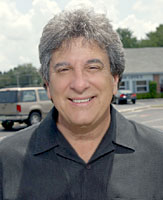 Check out what happened to Rodney on
Check out what happened to Rodney on